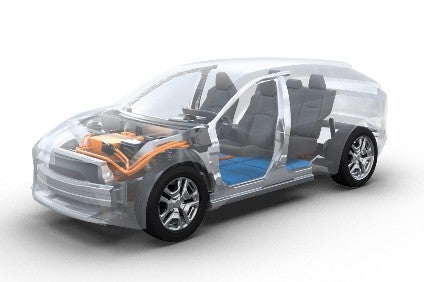
Toyota and Subaru are again to develop a vehicle jointly but this time it's a battery electric SUV and not a niche sportscar.
The pair have agreed to jointly develop a platform dedicated to battery electric vehicles (BEVs) for midsize and large passenger vehicles and to jointly develop a C-segment-class BEV SUV model for sale under each company's own brand.

Discover B2B Marketing That Performs
Combine business intelligence and editorial excellence to reach engaged professionals across 36 leading media platforms.
"By combining their respective strengths, such as the all-wheel-drive technologies that Subaru has cultivated over many years and the vehicle electrification technologies that Toyota is employing to bring together other companies that share its aspirations, the two companies intend to take up the challenge of creating attractive products with appeal that only BEVs can offer," Toyota and Subaru said in a joint statement.
Since concluding an agreement on business collaboration in 2005, Toyota and Subaru have deepened cooperation in various fields, including development, production, and sales.
Examples include efforts that led to the start of sales of the jointly developed rear-wheel-drive Toyota 86 and Subaru BRZ in 2012 and the start of sales of Subaru's Crosstrek Hybrid original plug-in hybrid electric vehicle (HEV) in the United States, to which was applied knowledge related to Toyota's HEV technologies. Subaru's US plant in Indiana also contract-built the top selling Camry sedan for some years.
"The automotive industry is in the midst of a once-in-a-century period of profound transformation," the statement added.
"Starting with responses to the new CASE domains of car connectivity, autonomous or assisted driving, new mobility or car-sharing, and electrified powertrains and components, both Subaru and Toyota are required to conduct technological development with a sense of speed across a broader-than-ever spectrum of initiatives.
"Building on their collaborative ties thus far deepened, the agreement announced today represents a new area of collaboration that especially focuses on the urgent need to respond to CASE's 'E' domain, or electrified powertrains and components.
"In addressing vehicle electrification, due to significant variation in the energy situations of each country or region and in government policies, as well as due to resulting differences in environmental regulations, in the stages of infrastructure preparation, and in market needs for electrified vehicles, efficient and speedy development of appropriate products is a must.
"Furthermore, the commercialisation of BEVs requires the use of large-capacity batteries, and, along with the popularization of BEVs, demands of a new dimension will be placed on battery supply.
"In addition, stemming from differences in how cars will be used due to maximum cruising ranges and the state of infrastructure construction, sales methods with a new approach will also be needed. These and other issues present a growing number of challenges related to costs, supply, and ways of selling.
"To respond with a sense of speed to the diversifying needs of these markets and to multiple challenges, both Subaru and Toyota believe that it is necessary to pursue a business model that goes beyond convention, crossing over industrial boundaries together with various types of other entities that share their aspirations.
"As a first step in this direction, while accelerating productization by bringing together technologies that represent each company's strengths and cooperating where possible, the two companies will jointly develop a BEV-dedicated platform. The platform will be developed in a way that will make it broadly applicable to multiple vehicle types, including C-segment-class and D-segment-class sedans and SUVs, as well as to efficient development of derivative vehicle models."
Reuters noted that. while Toyota has led in technologies for hybrid and fuel cell vehicles, it has trailed behind rivals such as Nissan Motor, Volkswagen and Tesla in bringing fully electric vehicles to showrooms.
As the smallest of Japan's major automakers, Subaru is struggling to independently invest in and develop lower-emission vehicles and on-demand transportation services widely seen as necessary to survive technological upheaval in the global auto industry.
It is also struggling with a spate of recent production- and quality-related issues, the side effects of rapid growth to keep up with booming for its Legacy sedans and Forester SUV crossovers in the United States, its biggest market.






